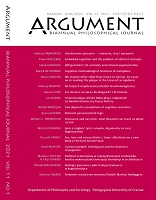Common people: Kierkegaard and the dialectics of populism
Common people: Kierkegaard and the dialectics of populism
Author(s): René RosfortSubject(s): Existentialism
Published by: Wydawnictwo Uniwersytetu Komisji Edukacji Narodowej w Krakowie
Keywords: liberalism; existential philosophy; elitism; equality; faith; reason; enlightenment; humanism;
Summary/Abstract: In this article, I propose to use Søren Kierkegaard’s existential critique of the establishment — intellectual, social, and religious — in the name of common people to bring out the dialectic character of populism often overlooked or ignored in the present-day use of the concept. Although populism is generally viewed as negative, Kierkegaard can help us to see that notwithstanding the very real and dangerous threat that populism poses to liberal societies, it is not, from a liberal perspective, unequivocally negative. Populism is endemic to liberalism, and we should not — and cannot — simply try to suppress or eradicate populism from our agendas. Instead, we have to see how populism dialectically reveals serious problems at the heart of contemporary liberalism. A Kierkegaardian approach to populism will allow me to bring out one of the most fundamental of these problems, namely the persistent inequality that permeates liberal democracies undermining the admittedly vague Enlightenment ideal of equality.
Journal: ARGUMENT: Biannual Philosophical Journal
- Issue Year: XI/2021
- Issue No: 1
- Page Range: 171-192
- Page Count: 22
- Language: English

